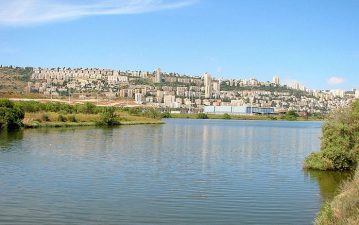 Microfinance loans help Syrian farmers meet their water needs to grow crops like this tasty spread at a market in Damascus.
Microfinance loans help Syrian farmers meet their water needs to grow crops like this tasty spread at a market in Damascus.
While severe drought in eastern and northeastern Syria is seriously affecting lives and livelihoods, farmers may draw some hope and comfort from an irrigation success story in the central district of Salamieh. An experimental drip irrigation project run by the Aga Khan Rural Support Programme (RSP) in the village of Fraytan (17 farmers) in 2003, has spread to 52 villages today.
“Fraytan was chosen because of the availability of irrigated land and wells. It is an area where the majority of farmers still used the traditional form of irrigation and a sense of cooperation among them existed,” Ali Zein, project manager in Salamieh, told IRIN.
Zein explained that drip irrigation systems are operational for 5-10 years, resulting in more profits for farmers long after the systems have been installed and paid for. With a drip system, upwards of 90 percent of the water is used by the plant, while with surface irrigation this rate drops below 60 percent.
This improved irrigation system draws water from a well and sends it directly to the plants through a series of pipes which are pierced with hundreds of small holes, restricting the overall flow of water so that there is reduced waste.
Over the past 25 years, the area of irrigated land around Salamieh has more than halved, and 60 percent of the wells there have dried up. The water table has been dropping in some areas at a rate of one metre per year since 1985, and Syria has already become “water scarce”.
Microfinance
In the past, government loans were difficult for farmers to acquire for a number of reasons: they had to have licensed wells, prove land ownership, and have a guarantor for the sum they were looking for.
Because there is more water farmers can, for example, replant twice in one yearFirst Microfinance Institute – Syria (FMFI-S), which opened its third Damascus branch on 28 January, is providing group loans for farmers in Fraytan and in other villages in Salamieh. The Rural Support Programme began work on demonstration fields for summer vegetables in 2004 while group loans were made from the following year.
Zein said local skepticism about the project was eventually overcome with all 17 farmers participating in the project. About 90 percent of the land used for summer vegetables and fruit trees in Salamieh District is now cultivated with modernized irrigation, he said.
The sizes of loans for drip irrigation vary from SYP5,000 (US$100) to SYP18,000 ($360), depending on the size of the plots and equipment needed by each farmer. The group is collectively responsible for the repayment of the loan. The villagers of Fraytan have formed a water-users association and selected a leader to manage the loan and an accountant to tabulate the finances and required payments, Zein said.
Win-win
The real success of the project has been the combination of increased incomes and a reduced use of water.
The farmers used about 30 percent less water this year to grow their summer vegetables and the collective adoption of new technologies resulted in increased yields of nearly 60 percent, according to the Aga Khan Development Network (AKDN).
“It’s quite simple. Because there is more water farmers can, for example, replant twice in one year,” Zein said.
Abu Alim, 85, who has been farming the same four hectares of land for over 50 years, said he had experienced other advantages of the drip irrigation system.
“Because we are pumping less water to the crops, we are using less diesel and that’s good because the cost of this is three times more expensive than two years ago,” he said.
In addition, farmers work half the time they used to and fuel costs have been cut by up to 64 percent, according to Abu Alim’s son Thaher.
The Fraytan model is being replicated in other communities in Salamieh District and loans for other agricultural needs, such as animal feed, are being introduced to revive rural livelihoods.
More on Syria:
Syria Brainstorms on Renewable Energy
Syria’s President Appoints Woman As New Environment Minister
A Nature Peace Park Won’t Work Without Syrian-Israel Peace First‘
(This story comes courtesy of Irin News.) Image via paulk




Water has been a problem for many through the years. It is nice to know that they have found a solution for this.